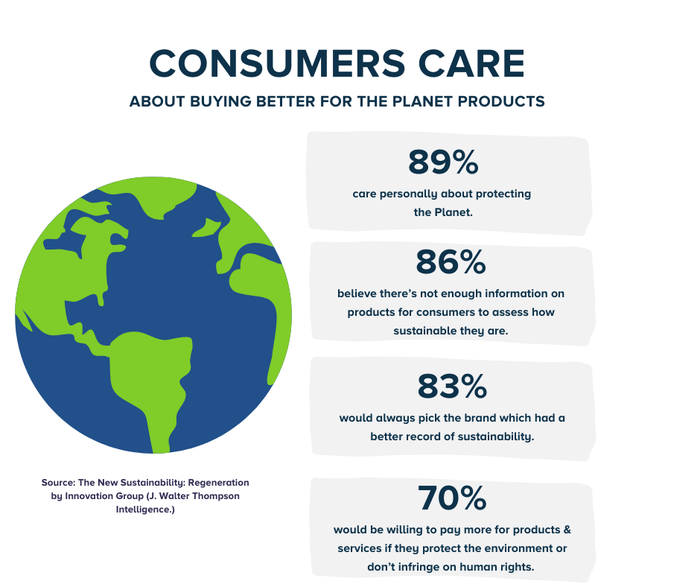Consumers care about supporting regenerative agriculture, even if they don’t know all the terms and jargon. Here's how brands can effectively promote their regenerative labels and claims.

Today’s consumers want their purchasing power to be able to change the world. It isn’t just millennials or the “dark green” consumers that care about environmental impact; these values are now mainstream.
The growing buzzword of “regenerative agriculture,” listed as Whole Foods Market’s Top Ten Food Trends in 2020, is all about quantifying environmental impact and promoting the nexus of when the way food is grown is actually part of making the ecosystem healthier. It’s about improving soil health, sequestering carbon, increasing water tables, improving wildlife habitat and fostering biodiversity. There is a whole new frontier burgeoning driven by a democracy of impact data.
Yet most consumers have never seen a third-party regenerative label on products they buy. And while the consumer definitely wants their purchase to be a force for good, the term “regenerative” may be new to them.

The consumer may also be confused by scientific jargon that is common in the regenerative agriculture, ecosystem services, or “beyond organic” arenas. We don’t need consumers to understand all the ins and outs of regenerative farming; we just need them to understand how it already connects with their values. Additionally, there must be the highest levels of integrity around regenerative claims to build trust with consumers. Brands and retailers can demonstrate that they hold the same values and convictions as their customers, and that they are bringing products to market backed by empirical science and robust data. Then when consumers see products with a third-party verification addressing regenerative, like Land to Market, they often change behavior and make new purchases; they shop with their heart.
Best practices to promote your regenerative labels and claims to consumers
Put your most important labels or claims on the front of your product packaging.
When creating new product photography and videography, get some close-up shots of your regenerative labels or claims and share them with your labeling partner (like Land to Market.)
Farmer Hero—create full traceability back to farm for at least one SKU or a capsule line and highlight the regenerative grower(s) behind that line.
Have a section on your website about your regenerative label and claims. Better yet, feature a short video about what your brand is doing to source regeneratively or on-farm efforts to heal and regenerate the land.
Leverage campaigns and awareness months with your regenerative labeling partner, like January’s #REGENUARY, made popular by The Ethical Butcher in the U.K.
Ask your regenerative labeling partner how best to collaborate with them on consumer marketing and check in with them regularly to plan to collaborate together.
Our longest Land to Market partner with verified and labeled products in the marketplace is EPIC Provisions. They recently launched a new climate-beneficial beef bar backed by Land to Market and a life cycle assessment (LCA). The beef in this product is all coming from one of the most well-known regenerative farms in the country, White Oak Pastures. EPIC always does an amazing job of highlighting the farmers they work with and giving credit to them for their amazing stewardship.
Another great example is Range Patagonian Grass-Fed Beef, our first Chilean beef partner. Brands like Range work with a local Savory Global Network Hub (in this case Efecto Manada,) which are committed to promoting a way of life that will contribute to caring for our planet, to leave it better than the way we received it. Partnerships like this allow farmers and consumers, the beginning and ending of the chain, to connect over shared ethos, which is a win for both sides.
Consumers tell us that they want to know the stories behind products, like grass-fed beef. Farmers deserve the credit and consumers deserve to know what makes something extra special and better for the environment.
5 ways brands can tell their regenerative stories
Research: Ask your own consumers what’s important to them and why.
Consumer education: Connect the dots between shared values. Consider creating ongoing content around the following topics:
Regenerative
Climate beneficial
Soil health
Food and water security
Wildlife and biodiversity
Collaborate with your labeling program’s marketing and PR team (like Land to Market) to cross-pollinate with their audience to promote what your brand is doing in the regenerative space.
Proactively promote your labels and claims in your consumer marketing. We’re often surprised that brands take great effort to earn verifications and certifications but do little to nothing to promote them.
Invite and educate your retail partners on how to champion regenerative products to their shoppers.
If you have a regenerative story to tell, consider explaining it through a short video clip showing a behind-the-scenes look at what your farm or brand is doing—highlighting some of the extra effort that goes into managing or sourcing from a regenerative production system.
Consumers are eager to take the old cliché of “vote with your dollar” to the next level and are hungry to support companies that are doing their part to care for the planet.
Chris Kerston co-leads Land to Market, a program of the Savory Institute that connects agricultural producers with progressive brands. Lisa Mabe-Konstantopoulos is the CEO of Green Purse PR and works as a marketing communications consultant to the Land to Market team.
About the Author(s)
You May Also Like






